(完整版)小学英语情态动词知识点及练习
(完整)英语语法 情态动词及练习题
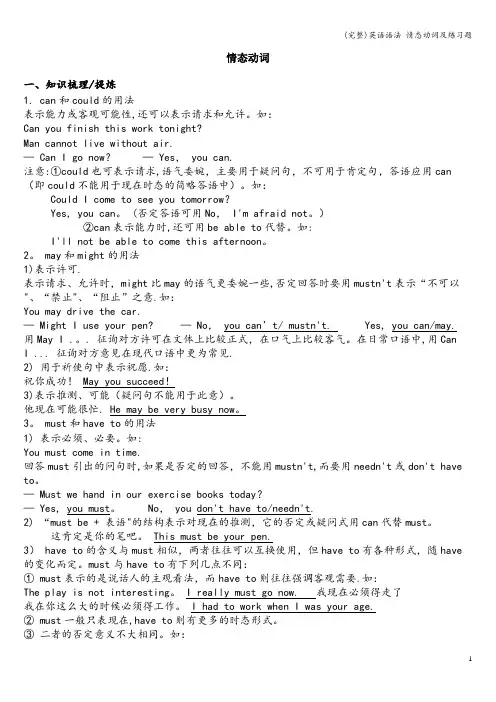
情态动词一、知识梳理/提炼1. can和could的用法表示能力或客观可能性,还可以表示请求和允许。
如:Can you finish this work tonight?Man cannot live without air.— Can I go now?— Yes, you can.注意:①could也可表示请求,语气委婉,主要用于疑问句,不可用于肯定句,答语应用can (即could不能用于现在时态的简略答语中)。
如:Could I come to see you tomorrow?Yes, you can。
(否定答语可用No, I'm afraid not。
)②can表示能力时,还可用be able to代替。
如:I'll not be able to come this afternoon。
2。
may和might的用法1)表示许可.表示请求、允许时,might比may的语气更委婉一些,否定回答时要用mustn't表示“不可以"、“禁止"、“阻止”之意.如:You may drive the car.— Might I use your pen? — No,you can’t/ mustn't. Yes, you can/may. 用May I .。
. 征询对方许可在文体上比较正式,在口气上比较客气。
在日常口语中,用CanI ... 征询对方意见在现代口语中更为常见.2) 用于祈使句中表示祝愿.如:祝你成功! May you succeed!3)表示推测、可能(疑问句不能用于此意)。
他现在可能很忙. He may be very busy now。
3。
must和have to的用法1) 表示必须、必要。
如:You must come in time.回答must引出的问句时,如果是否定的回答,不能用mustn't,而要用needn't或don't have to。
(完整版)情态动词专项练习及答案
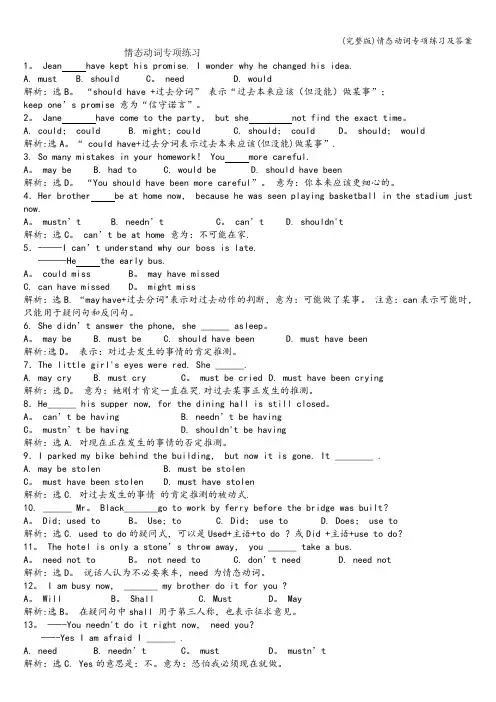
情态动词专项练习1。
Jean have kept his promise. I wonder why he changed his idea.A. mustB. should C。
need D. would解析:选B。
“should have +过去分词” 表示“过去本来应该(但没能)做某事”;keep one’s promise 意为“信守诺言”。
2。
Jane have come to the party, but she not find the exact time。
A. could; couldB. might; couldC. should; could D。
should; would解析:选A。
“ could have+过去分词表示过去本来应该(但没能)做某事”.3. So many mistakes in your homework! You more careful.A。
may be B. had to C. would be D. should have been解析:选D。
“You should have been more careful”。
意为:你本来应该更细心的。
4.Her brother be at home now, because he was seen playing basketball in the stadium just now.A。
mustn’t B. needn’t C。
can’t D. shouldn't解析:选C。
can’t be at home 意为:不可能在家.5.-——I can’t understand why ou r boss is late.———He the early bus.A。
could miss B。
may have missedC. can have missed D。
might miss解析:选B. “may have+过去分词"表示对过去动作的判断,意为:可能做了某事。
小学英语情态动词练习题及答案
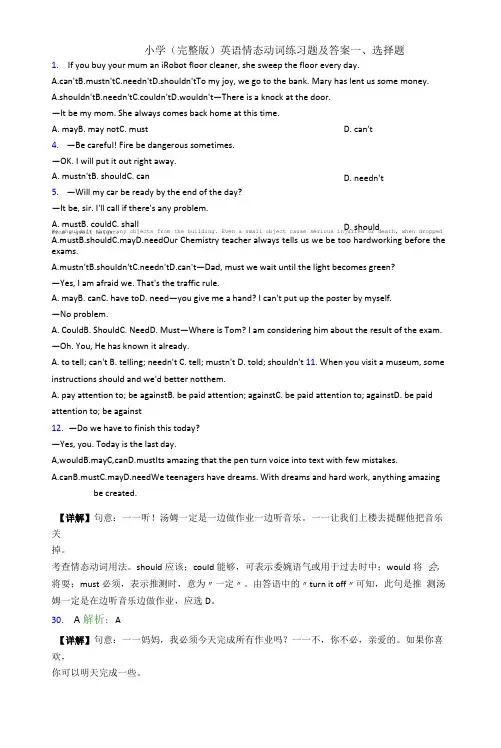
小学(完整版)英语情态动词练习题及答案一、选择题1. If you buy your mum an iRobot floor cleaner, she sweep the floor every day.A.can'tB.mustn'tC.needn'tD.shouldn'tTo my joy, we go to the bank. Mary has lent us some money.A.shouldn'tB.needn'tC.couldn'tD.wouldn't —There is a knock at the door.We shouldn't throw any objects from the building. Even a small object cause serious injuries or death, when dropped from a great height. A.mustB.shouldC.mayD.needOur Chemistry teacher always tells us we be too hardworking before the exams. A.mustn'tB.shouldn'tC.needn'tD.can't —Dad, must we wait until the light becomes green? —Yes, I am afraid we. That's the traffic rule.A. mayB. canC. have toD. need —you give me a hand? I can't put up the poster by myself.—No problem.A. CouldB. ShouldC. NeedD. Must —Where is Tom? I am considering him about the result of the exam. —Oh. You, He has known it already.A. to tell; can'tB. telling; needn'tC. tell; mustn'tD. told; shouldn't 11. When you visit a museum, some instructions should and we'd better notthem.A. pay attention to; be againstB. be paid attention; againstC. be paid attention to; againstD. be paid attention to; be against12. —Do we have to finish this today?—Yes, you. Today is the last day.A,wouldB.mayC,canD.mustIts amazing that the pen turn voice into text with few mistakes.A.canB.mustC.mayD.needWe teenagers have dreams. With dreams and hard work, anything amazingbe created.【详解】句意:一一听!汤姆一定是一边做作业一边听音乐。
情态动词的用法(附练习及参考答案)
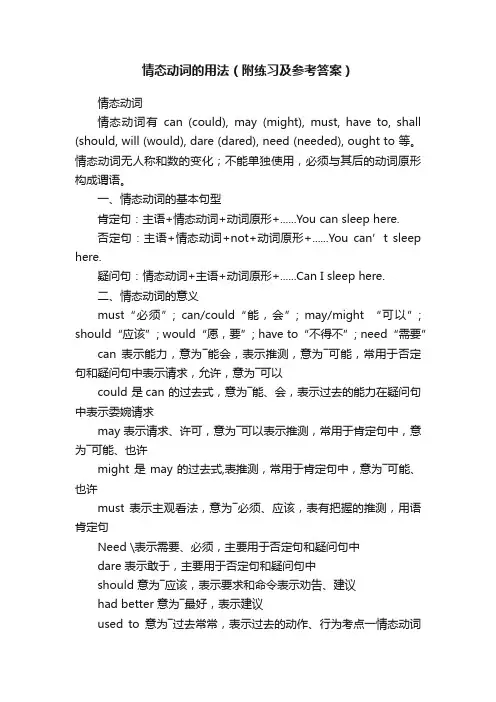
情态动词的用法(附练习及参考答案)情态动词情态动词有can (could), may (might), must, have to, shall (should, will (would), dare (dared), need (needed), ought to 等。
情态动词无人称和数的变化;不能单独使用,必须与其后的动词原形构成谓语。
一、情态动词的基本句型肯定句:主语+情态动词+动词原形+......You can sleep here.否定句:主语+情态动词+not+动词原形+......You can’t sleep here.疑问句:情态动词+主语+动词原形+......Can I sleep here.二、情态动词的意义must“必须”; can/could“能,会”; may/might “可以”; should“应该”; would“愿,要”; have to“不得不”; need“需要”can 表示能力,意为―能会,表示推测,意为―可能,常用于否定句和疑问句中表示请求,允许,意为―可以could 是can 的过去式,意为―能、会,表示过去的能力在疑问句中表示委婉请求may 表示请求、许可,意为―可以表示推测,常用于肯定句中,意为―可能、也许might 是may的过去式,表推测,常用于肯定句中,意为―可能、也许must 表示主观看法,意为―必须、应该,表有把握的推测,用语肯定句Need \表示需要、必须,主要用于否定句和疑问句中dare 表示敢于,主要用于否定句和疑问句中should 意为―应该,表示要求和命令表示劝告、建议had better 意为―最好,表示建议used to意为―过去常常,表示过去的动作、行为考点一情态动词情态动词有具体的词义,但也同助动词一样,需要与其他词语一起构成句子的谓语,另外情态动词没哟人称和数的变化,情态动词后必须跟动词原形。
三、情态动词的基本用法1. can 的用法(1)表示能力、许可、可能性。
(完整版)情态动词专项练习.doc
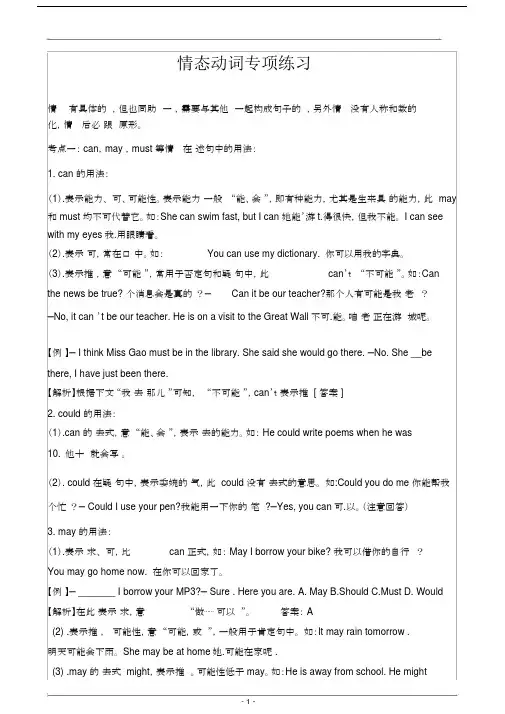
情态动词专项练习情有具体的,但也同助一,需要与其他一起构成句子的,另外情没有人称和数的化,情后必跟原形。
考点一: can,may ,must 等情在述句中的用法:1.can 的用法:(1).表示能力、可、可能性。
表示能力一般“能、会”,即有种能力,尤其是生来具的能力,此 may 和 must 均不可代替它。
如:She can swim fast, but I can 她能’游t.得很快,但我不能。
I can see with my eyes我.用眼睛看。
(2).表示可,常在口中。
如:You can use my dictionary. 你可以用我的字典。
(3).表示推,意“可能”,常用于否定句和疑句中,此can’t “不可能”。
如:Can the news be true?个消息会是真的?—Can it be our teacher?那个人有可能是我老?—No, it can ’t be our teacher. He is on a visit to the Great Wall不可.能。
咱老正在游城呢。
【例】— I think Miss Gao must be in the library. She said she would go there. —No. She __be there, I have just been there.【解析】根据下文“我去那儿”可知,“不可能”,can’t表示推 [ 答案 ]2. could 的用法:(1).can 的去式,意“能、会”,表示去的能力。
如: He could write poems when he was10.他十就会写。
(2). could 在疑句中,表示委婉的气,此 could 没有去式的意思。
如:Could you do me 你能帮我个忙?— Could I use your pen?我能用一下你的笔 ?—Yes, you can可.以。
(完整版)情态动词专项练习(含答案)
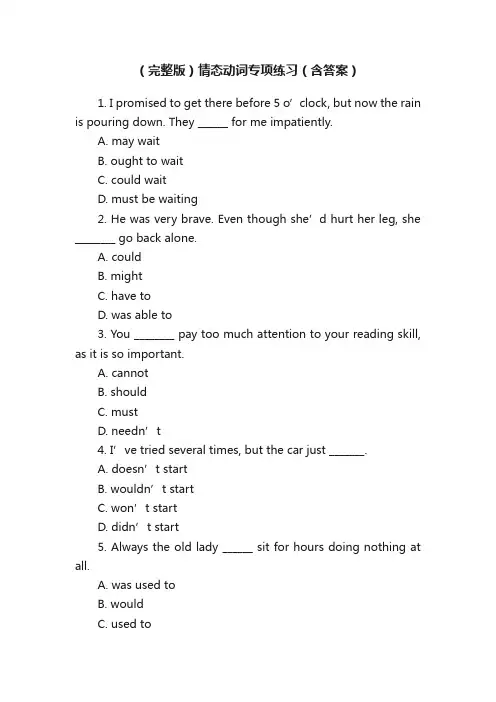
(完整版)情态动词专项练习(含答案)1. I promised to get there before 5 o’clock, but now the rain is pouring down. They ______ for me impatiently.A. may waitB. ought to waitC. could waitD. must be waiting2. He was very brave. Even though she’d hurt her leg, she ________ go back alone.A. couldB. mightC. have toD. was able to3. You ________ pay too much attention to your reading skill, as it is so important.A. cannotB. shouldC. mustD. needn’t4. I’ve tried several times, but the car just _______.A. doesn’t startB. wouldn’t startC. won’t startD. didn’t start5. Always the old lady ______ sit for hours doing nothing at all.A. was used toB. wouldC. used toD. should6. There used to be a small school,___________?A. was thereB. wasn’t itC. usedn’t thereD. usedn’t it7. Our house is on the top of the hill, so in summer the wind _____ be pretty cold.A. mustB. canC. ought toD. need8. Haven’t I told you that you __________ have the ans wer tomorrow morning?A. willB. shallC. shouldD. would9. I’m surprised that he _______ in the match.A. should failB. should have failedC. would have failedD. may have failed10. Better go to see my sick colleague right now, ________I?A. hadn’tB. didn’tC. don’tD. won’t11. Sir, you ______ be hunting deer here, for they are preserved by the government.A. oughtn’t toB. can’tC. won’tD. needn’t12. Sorry I’m late. I ______ have turned off the alarm clock and gone back to sleep again.A. mightB. shouldC. canD. will13. —There were already five people in the car, but they managed to take me as well.— It __________ a comfortable journey.A. can’tB. shouldn’t beC. must have beenD. couldn’t have been14. To be on the safe side, we should fill up the tank now, because we ______ run out of gas on the way.A. canB. wouldC. mightD. should15. ____ three people who travel together, there _____ be at least one who ____ be my teacher.A. Between; can; willB. In; should; couldC. Among; will; mayD. Of; must; can16. —Could you lend me that book you ______ me aboutwhen I telephoned you?—No, I am sorry, I can’t. I gave it to a friend.A. were tellingB. would tellC. had toldD. had been telling17. —We need a person badly to think up such an idea.—_______ the new comer have a try?A. ShallB. MayC. ShouldD. Need18. We ________ so tired. We’ve only been to a party.A. mustn’t have feltB. wouldn’t have feltC. shouldn’t have feltD. couldn’t have felt19. Professor Smith, many students want to see you. __________ they wait here or outside?A. DoB. ShallC. WillD. Would20. —How about paying a visit to Mr. Richardson, our former history teacher?—Good idea. I will e-mail him today so he _____know _________ to expect us.A. shall; whyB. may; whenC. would; whyD. will; how21. —I went to work on foot yesterday, though it _________ cats and dogs.—You __________ by bus. It was likely to get a cold.A. is raining; must have goneB. rained; would goC. was mining; should have goneD. have rained; could have gone22. You ______ pay too much attention to your reading skill, as it is so important.A. cannotB. shouldC. mustD. needn’t23. I told Sally to fix him up with this job, but perhaps I _________ it out for her.A. had to writeB. must have writtenC. should have writtenD. ought to write24. My sister met him at the Grand Theatre yesterday afternoon, so he ________ your lecture.A. couldn’t have attendedB. needn’t have attendedC. mustn’t have attendedD. shouldn’t have attended25. Research findings show we spend about two hours dreaming every night, no matter what we ________ during the day.A. should have doneB. would have doneC. may have doneD. must have done26. —Is there any flight to Tokyo today?— I think there _____, for the weather is too bad.A. mustn’t beB. mightn’t beC. needn’t beD. can’t be27. —I’m told that John had another car accident this morning.— I believe not. He _____ so careless.A. shouldn’t have beenB. wouldn’t have beenC. couldn’t have beenD. mustn’t have be en28. It was playing computer games that cost the boy a lot of time that he __________ doing his lessons.A. might have spentB. ought to have spentC. must have spentD. could have spent29. —I didn’t know you were good friends.—You _______. I have known her since she moved here. You were studying abroad then.A. may haveB. needn’t haveC. couldn’t haveD. must have30. They must have finished the work by the end of last month, __________?A. mustn’t theyB. haven’t theyC. hadn’t theyD. didn’t they31. —I didn’t see her yesterday.— Of course, you _____, because he had gone for a trip.A. can’tB. may not haveC. can’t haveD. mustn’t have32. You ________ phone him if you want to, but you _________. He is sure to phone you.A. may; mustn’tB. have t o; needn’tC. can; doesn’t needD. can; needn’t33. — She must have gone back to the valley.— ______, she _____ have. The entrance to it was nowhere to be found.A. No; mustn’tB. Yes; mightC. Yes; couldD. No; couldn’t34. He _____ full marks, but he was so careless as to make a spelling mistake.A. must have gainedB. can have gainedC. could have gainedD. must gain35. From what you said, she _____ you about it.A. mustn’t have toldB. can’t have toldC. mustn’t tellD. can’t tell36. — You ought to have made an apology to Tom yesterday evening.— Yes, I know I _________.A. ought toB. have toC. should haveD. must have37. —Is there a fog in the evening?—There _______ be. I’ll make a phone call to find it out.A. mustB. wouldC. willD. might38. — _______ he help you with the problem?—Well, though it is very hard, __________ I’ll do what I can to work it out.A. Shall; butB. Can; andC. Must; howeverD. Will; still39. —How is that, Joan?—Yeah, it’s from the boss. She _________ first, whether she likes it.A. shall goB. ought to have goneC. should goD. must have gone40. —Would you like to watch the video, in which you can see foreigners making jiaoji during the Spring Festival?—Sure, it ______ be very interesting.A. shouldB. mayC. canD. will41. —The door was open.—It _________ open. I had locked it myself and the key was in my pocket.A. can not beB. must not beC. can not have beenD. must not have been42. —Where ________ Margaret have put the empty bottles?—She ________ them away. They must be somewhere.A. can; can’t have thrownB. must; needn’tC. must; must have thrownD. cant; must throw43. —Mum, I climbed to get the Teddy Bear from the top of the shelf.—My goodness! You _______ yourself. You ______ do that next time.A. mu st have hurt; mustn’tB. should have hurt; can’tC. may have hurt; mustn’tD. might have hurt; won’t be able to44. —Shall I go and buy more food and drinks for the party?—No, we have prepared a fridge of those. That _______ be quite enough.A. canB. mayC. mightD. ought to45. —Hurry up, Michael! It’s ten to three.—Goodness me! The class_______. I’ll be late again.A. must beginB. may beginC. should have begunD. must have begun46. When he was there, he ____ go to that coffee shop at the street comer after work every day.A. wouldB. shouldC. had betterD. might47. —I hear you have written a novel.—Yes, the book ________ be out in a month or so.A. canB. dareC. shouldD. need48. —How could I thank you enough?—Don’t mention it. Any other man _________ that.A. must doB. could doC. would have doneD. should have done49. —Why aren’t they here yet?—They ________ the bus.A. can have missedB. must be late forC. may have missedD. might be late for50. Mike _______ come to see me I don’t want to go out in case he comes.A. canB. mustC. mayD. will51. The thief ________ in from the kitchen window as the door was closed.A. may climbB. must have climbedC. could have climbedD. should have climbed52. —You didn’t invite Bill?— __________ him too?A. Must I inviteB. Must I have invitedC. Should I inviteD. Should I have invited53. —Why didn’t you attend the lecture yesterday?—I didn’t think that we _______ on Sundays.A. shouldB. ought to haveC. shouldn’t haveD. will have to54. It’s said that there are plenty of hotels in that town. There ______ be any difficulty for you to find somewhere to stay.A. wouldn’tB. mustn’tC. shouldn’tD. needn’t55. —Would you be here to attend the English party this evening?—Yes, we _________.A. shallB. wouldC. willD. must56. On Sundays when I was a child, Father and I _______ get up early and go fishing.A. couldB. wouldC. mightD. should57. —You’d better keep quiet in class.—Sometimes I ________ Yesterday, I was very quiet during my English class.A. wouldB. doC. didD. have58. I lived with my sister this summer and didn’t have to pay rent. So I ______ save most of my salary.A. couldB. wouldC. was able toD. should59. —Look, John’s fallen asleep.— Oh, he _______ too late last night.A. might sit upB. should have sat upC. could sit upD. must have sat up60. —I posted the letter a week ago.—Then they __________ the letter by now. It usually takes four days.A. can have receivedB. must receiveC. should receiveD. ought to have received61. He used to teach in that university and I _________ ride past it on my way to work.A. wouldB. couldC. shouldD. might62. —So you have to leave now.—Yes, I __________.—How nice it would be if you could stay a bit longer!A. have toB. ought toC. doD. have63. He _______ Shanghai, for I saw him talking with the headmaster a moment ago.A. must have gone toB. can’t have gone toC. mustn’t have been toD. can’t have been to64. From what I learn about their hotel, the service and the weather, they _____ their holiday very much.A. wouldn’t have enjoyedB. shouldn’t have enjoyedC. needn’t have enjoyedD. can’t have enjoyed65. It is not like Jack to be unfriendly, so he _________ you when you called.A. can’t have seenB. should not have seenC. must not have seenD. need not have seen66. —Many people in England love to give advice on weather reporting.—Yes, but I think the weather office’s computers _________ be more accurate.A. canB. mustC. ought toD. might67. —The farmers lived near the high way.—________ very noisy.A. It must have beenB. They must beC. That might beD. There must be68. She is too slow. She ________ pass the test, but she __________ too little.A. would; knewB. will; knowsC. would; knowsD. will; knew69. —Mary didn’t turn up last time, did she?—No. She_________. We had changed our plan.A. shouldn’t have comeB. needn’t have to comeC. didn’t need to comeD. needn’t have come70. —They haven’t finished the work up to now.—Well, they________.A. shouldB. should haveC. wouldD. must have71. —Shall I go and buy more fruit for the party?—No, I have already bought 3 baskets. That _________ be enough.A. canB. ought toC. mayD. might72. —Why hasn’t the speaker turned up?—He _________ the flight. I’ll find it out at once.A. must have missedB. might have missedC. would have missedD. could have missed73. I _______ pay Tom a visit, but I am not sure whether I will have time this Sunday.A. shouldB. mightC. wouldD. could74. —Who is the girl standing over there?— Well, if you _____ know, her name is Mabel.A. mayB. canC. mustD. shall75. It has been announced that candidates (考生)________ remain in their seats until all the papers have been collected.A. canB. willC. mayD. shall【答案解析】1.D。
(完整版)小学英语情态动词知识点及练习
神情动词【知识要点】 :神情动词( Modal verbs )自己有必然的词义,表示语气的单词。
但是不能够独立作谓语,只能和动词原形一起构成谓语。
神情动词用行家为动词前,表示说话人对这一动作或状态的看法或主观设想。
神情动词诚然数量不多,但用途广泛,主要有以下:can (could), may (might), must, need, ought to,dare (dared), shall (should), will (would) must not.神情动词无人称和数的变化,神情动词后边跟的动词须用原形,否定式构成是在神情动词后边加 "not" 。
疑问形式是将神情动词提至主语前。
个别神情动词有现在式和过去式两种形式,过去式用来表达更加客气,宛转的语气,时态性不强,可用于过去,现在或将来。
神情动词属非及物动词,故没有被动语态。
【典型例题】:【专题一】 : can 和 could 的用法【例 1】 Can you lift this heavy box? ( 体力 )【剖析】表示能力 ( 体力、知识、技术 )【练习】1. Mary speak three languages.( 知识 )2.you skate?( 技术 )此时可用 be able to 代替。
Can 只有一般现在时和一般过去式则有更多的时态。
; 而be able toI ’ ll not be able to come this afternoon.be able to,不能够用Can。
当表示“经过努力才得以做成功某事”时应用【例 2】-----Can I go now?-----Yes, you can. / No, you can’t.【剖析】表示恳求和赞同。
此时可与 may互换。
在疑问句中还可用 could,might 代替 , 不是过去式 , 可是语气更宛转 , 不能够用于必然句和答语中。
【练习】----I come to see you tomorrow?---- Yes, you.---- No, you/I ’m afraid not.【例 3】 Can this be true?【剖析】表示推断 ( 惊讶、思疑、不相信的态度 ), 用于疑问句、否定句和惋惜句中。
情态动词讲解及练习(含答案)
情态动词讲解及练习(含答案)一、单项选择情态动词1.—You rang me up at about 10:00 last night, didn't you?—No, I didn't phone you. It someone else.A.must have been B.could be C.must be D.could have been 【答案】A【解析】【详解】考查情态动词+have done。
句意:“昨晚10点左右你给我打了电话,是吗?”“不,我没给你打电话。
一定是别人干的。
” must have done 是对过去发生的动作最有把握的猜测,意思是“一定”,结合语境可知,我没有打电话给你,因此猜测一定有别人给你打了电话。
故选A 项。
2.—I don’t really like Janes. Why did you invite him?—Don’t worry. He come. He said he was’t certain what his plans were.A.must not B.need not C.would not D.might not【答案】D【解析】考察情态动词,题干中的he wasn’t certain说明他可能不来,可能来,因此使用不完全否定,might not。
3.Mr. Baker, some students want to see you. ______ they wait here or outside?A.May B.Should C.Shall D.Will【答案】C【解析】【详解】考查Shall的用法。
句意:贝克先生,有些学生想见你。
他们是在这里等还是在外面等?Shall用于第一、第三人称疑问句中,表示说话人征求对方的意见或向对方请示。
故选C。
【点睛】Shall的用法Shall作为助动词,一般用于第一人称Ⅰ和We,表示一个将来的动作,构成将来时态。
小学英语常考情态动词及习题练习
小学常考情态动词(can,must,should,might)及习题情态动词:情态动词本身具有一定的词义,表示说话人的某种语气或感情,但不能单独作谓语,通常要和行为动词一起构成谓语。
情态动词没有人称和数的变化,适用于所有人称,其后要接动词原形。
一、情态动词can的用法:1、其中情态动词can表能力时意为“能够做某事”,后接动词原形;否定形式为can't或cannot;can的过去式为could。
例:1.Tony can play basketball, but he can't play the piano.Tony会打篮球,但他不会弹钢琴。
2.Can Lily speak Chinese? —Lily会说中文吗?-Yes, she can. —是的,她会。
3.What can you do, Kate? —Kate,你会做什么?-I can play the violin. —我会拉小提琴。
2、其中情态动词can表许可或请求别人的许可时,意为“可以”,后接动词原形,相当于may,但may多用于正式、庄重的场合;can的否定形式为can't 或cannot。
例:You can go now if you like. 如果你想走,现在就可以走了。
-Mark, can I use your pen? —Mark,我能用下你的钢笔吗?-Of course. —当然了。
二、情态动词must表示“必须,应该,一定要”。
●∙主语是第一人称I或we时,表示说话人认为有必要或者有义务做某事;主语是第二、第三人称you、they、he、she等时,表示说话人要求或命令别人做某事。
●∙must的否定形式为must not,缩写为mustn't,意为“不许;严禁”。
●∙must引导的一般疑问句,肯定回答用must,否定回答用needn't或don'thave to,意为“不必”。
小学(完整版)英语情态动词专项练习及答案
小学(完整版)英语情态动词专项练习及答案一、选择题1.You'd better __________ hard from now on, __________ you will fail the exam. A.work; and B.working; or C.working; and D.work; or 2.To my joy, we_________ go to the bank. Mary has lent us some money. A.shouldn’t B.needn’t C.coul dn’t D.wouldn’t 3.—I think they are enough. We ________ make so many chairs.—I don’t think so. Because nearly a quarter of them need ________.A.don’t need to; mending B.needed; to be mendedC.don’t need; mend D.need; to mend4.We teenagers ________ have dreams. With dreams and hard work, anything amazing ________ be created.A.may; can B.might; should C.should; can D.must; has to 5.You ________ be careful with the camera. It costs!A.can B.will C.should D.may 6.—Who’s singing next door? Is it Miss Wang?—It ________ be her. She’s having the board meeting.A.can’t B.shouldn’t C.mustn’t D.needn’t 7.—Do we have to finish this today?—Yes, you ________ . Today is the last day.A.would B.may C.can D.must 8.—There is a knock at the door.—It ________ be my mom. She always comes back home at this time.A.may B.may not C.must D.can’t 9.—Will my car be ready by the end of the day?—It ________ be, sir. I’ll call if there’s any problem.A.must B.could C.shall D.should 10.We shouldn’t throw any objects from the buildi ng. Even a small object ________ cause serious injuries or death, when dropped from a great height.A.must B.should C.may D.need 11.—Dad, must we wait until the light becomes green?—Yes, I am afraid we ________. That’s the traffic rule.A.may B.can C.have to D.need 12.—Who’s the man over there? Is that Mr. Black?—It ________ be him. Mr. Black is much taller than that man.A.may B.must C.can’t D.mustn’t 13.— Is Lang Lang going to perform at Art Center this Friday?— Yes. It ________ be him. He has been here for three days.A.might B.must C.mustn’t D.may 14.— What do you think of the show yesterday?— Some of them were really good but others ________ be better.A.will B.must C.need D.can15.When you visit a museum, some instructions should ________ and we’d better not________ them.A.pay attention to; be against B.be paid attention; againstC.be paid attention to; against D.be paid attention to; be against16.I ________ hear you clearly. Would you please repeat it?A.mustn’t B.can’t C.needn’t D.shouldn’t 17.— Zoe, what do you think is the greatest advantage of shopping online?— At least I ______ spend much time going from shop to shop.A.shouldn’t B.can’t C.needn’t D.mustn’t18.---Will you be back early this evening?---Yes, but I ________ be a little late. Our boss sometimes has extra work for us.A.may B.must C.need D.will19.We’ve discussed every detail of this plan and have got everything ready. But still something __________ go wrong. We still have to be very careful.A.must B.should C.would D.may 20.—Amy, I hear you've got many foreign coins._______ I have a look?—Of course, I'll fetch them for you.A.May B.MustC.Should D.Need21.—Shall we go camping this summer holiday?—Nothing________be better.A.should B.could C.must D.may22.My bike was broken yesterday,so I____walk home.A.might B.had to C.must D.could 23.—Would you please________in that way? That’s not safe!—Sorry. I won’t do it any more.A.not driving B.not to drive C.no driving D.not drive 24.Think twice before making a decision, or you __________ get into trouble.A.may B.can't C.shouldn't D.mustn't25.—________ you give me a hand? I can’t put up the poster by myself.—No problem.A.Could B.Should C.Need D.Must26.—In China, many parents complain that their children have to stay up late to do the homework.—Don’t worry. The government has realized the problem. I’m sure there ________ be good news soon.A.can B.should C.need D.must 27.—Could I join you in the programme?—Sorry, you ________. You are too young.A.shouldn’t B.mustn’t C.can’t D.needn’t 28.—Who is singing next door? It sounds like a young girl’s voice.—It _________ be Jane. But she seldom sings English songs.A.need B.must C.may D.can29.Hurry up, or we ________ miss the beginning of the film.A.should B.must C.may D.have to30.— Excuse me, could you tell me where the Nanjing Brocade Museum is?—Go along this road for five minutes. You ________ miss it. It’s a huge building.A.mustn’t B.can’t C.needn’t D.shouldn’t 31.—Why didn’t you tell it to me earlier?— Why ________ I? I want to have my own secret.A.can B.may C.should D.shall 32.—Mum, why do I have to wear a mask before entering the supermarket?—For your health and safety, you ________ be too careful.A.shouldn’t B.can’t C.mustn’t D.needn’t33.A hard-working man ________ become a great scientist, but a great scientist ________ be a hard-working man.A.can’t; can B.may not; must C.can’t; must D.may not; can 34.You _________ smoke here! Look at the sign. It says "No smoking".A.needn't B.mustn't C.can D.may35.—Must I finish all my homework today, Mum?—No, you ________, my dear. You can finish some tomorrow if you like.A.needn’t B.shouldn’t C.can’t D.mustn’t 36.Most young people like shopping online because they ________ spend much time going from shop to shop.A.needn’t B.can’t C.mustn’t D.shouldn’t 37.—________ I see your ID card? We have to check your personal information.—Sure. Here you are.A.May B.Need C.Should D.Must38.—Will Jim come to Yangzhou for a holiday?—He ________come and it depends on how much homework he will have.A.may B.should C.must D.need39.—Is it really necessary for me to go shopping with a mask on?—I’m afraid you ________ in public. It is not only to protect yourself but also to protect others. A.must B.should C.can D.need40.I think all the students love the weekends because, to them, they ________ get up early on Saturdays or Sundays.A.mustn’t B.don’t need C.needn’t D.can’t41.Look at the floor, Tom! ________ you watch TV while having a meal?A.Should B.Could C.Must D.May42.— Excuse me. I ha ven’t finished reading the book yet. May I keep it a bit longer?— Sorry, you ________. You must return it on time.A.needn’t B.can’t C.won’t D.shouldn’t 43.Cars ________ give way to walkers on some roads in Binhai, or the drivers will be fined. A.may B.will C.can D.must44.You’ve got an A in the maths test again. You ________ be good at it.A.can B.may C.must D.should45.Mr. Black ________ be at home now. He went abroad on vacation last Friday.A.can’t B.mustn’t C.needn’t D.shouldn’t 46.— The sandstorm in Beijing is so serious this year.— Yes, I wonder when we ________ worry about the air we breathe.A.can’t B.mustn’t C.needn’t D.shouldn’t 47.—The article says that a person’s animal sign decides his personality.—You ________ read it for fun, but don’t bel ieve in that.A.can B.must C.shouldn’t D.needn’t 48.—How beautiful the winter jasmines (迎春花) are!—Yes. These golden-yellow flowers ________ be widely seen in my city in March.A.must B.can C.would D.should 49.—Mum, I bought some strawberries on my way home.—Oh, you’re so sweet. But the strawberries ________ be put into the fridge for freshness. A.must B.can C.may D.need50.— Mum, why do I have to wash hands so many times a day?—You ________ be too careful, for your health.A.can’t B.mustn’t C.may not D.n eedn’t【参考答案】***试卷处理标记,请不要删除一、选择题1.D解析:D【详解】句意:你最好从现在开始努力学习,否则你考试会不及格的。
- 1、下载文档前请自行甄别文档内容的完整性,平台不提供额外的编辑、内容补充、找答案等附加服务。
- 2、"仅部分预览"的文档,不可在线预览部分如存在完整性等问题,可反馈申请退款(可完整预览的文档不适用该条件!)。
- 3、如文档侵犯您的权益,请联系客服反馈,我们会尽快为您处理(人工客服工作时间:9:00-18:30)。
情态动词【知识要点】:情态动词(Modal verbs)本身有一定的词义,表示语气的单词。
但是不能独立作谓语,只能和动词原形一起构成谓语。
情态动词用在行为动词前,表示说话人对这一动作或状态的看法或主观设想。
情态动词虽然数量不多,但用途广泛,主要有下列: can (could), may (might), must, need, ought to, dare (dared), shall (should), will (would) must not.情态动词无人称和数的变化,情态动词后面跟的动词须用原形,否定式构成是在情态动词后面加 "not"。
疑问形式是将情态动词提至主语前。
个别情态动词有现在式和过去式两种形式,过去式用来表达更加客气,委婉的语气,时态性不强,可用于过去,现在或将来。
情态动词属非及物动词,故没有被动语态。
【典型例题】:【专题一】:can和could的用法【例1】Can you lift this heavy box?(体力)【解析】表示能力(体力、知识、技能)【练习】1.Mary speak three languages.(知识)2. you skate?(技能)此时可用be able to代替。
Can只有一般现在时和一般过去式;而be able to 则有更多的时态。
I’ll not be able to come this afternoon.当表示“经过努力才得以做成功某事”时应用be able to,不能用Can。
【例2】-----Can I go now?----- Yes, you can. / No, you can’t.【解析】表示请求和允许。
此时可与may互换。
在疑问句中还可用could,might 代替,不是过去式,只是语气更委婉,不能用于肯定句和答语中。
【练习】---- I come to see you tomorrow?---- Yes, you .----No, you /I’m afraid not.【例3】Can this be true?【解析】表示推测(惊讶、怀疑、不相信的态度),用于疑问句、否定句和感叹句中。
【练习】This be done by him.How this be true?【专题二】may和might的用法:【例1】----M ight/ May I smoke in this room?---- No, you mus tn’t.【解析】表示请求和允许。
might比may语气更委婉,而不是过去式。
否定回答时可用can’t或mustn’t,表示“不可以,禁止”。
用May I...?征徇对方许可时比较正式和客气,而用Can I...?在口语中更常见。
【练习】---- I take this book out of the room?---- Yes, you . No, you【例2】May you succeed!【解析】用于祈使句,表示祝愿。
【例3】He may /might be very busy now.【解析】表示推测、可能性(不用于疑问句)。
might不是过去式,它所表示的可能性比may小。
【练习】1.Your mother not know the truth.2.He very busy now.他现在可能很忙。
【专题三】must和have to的用法:【例 1】The man be our teacher。
那个人一定是我们的老师。
【例 2】I study hard because of my dream .为了我的梦想我必须努力学习。
【例 3】1.You come in time.你必须准时过来【解析】:must表示必须、必要。
表示主观对事物的推测时,意为想必、一定,只用于肯定句中;表推测时,情态动词与动词原形(常为be动词)连用。
而have to强调客观需要。
【练习】:1.Her play is boring,I go now.2.Your mother be waiting for you now.3.I go home,because my father is ill.【例4】---Must we hand in our exercise books today?---Yes,you---No,you【解析】:在回答由must引出的问句时,如果是否定的,不能用mustn’t,而用needn’t,don’t have to.must是说话人的主观看法,而have to则强调客观需要。
【练习】:---Must he go to school now?---Yes,he---No,he .【专题四】should及其否定式用法【例 1】:I should help her because she is in trouble.【解析】:should表示应该、劝告、建议和命令。
【练习】:1.You go to class right away.2.I open the window?【专题四】need的用法【例1】:You needn’t come so early.【解析】need 作情态动词用时, 常用于疑问句、否定句。
在肯定句中一般用must, have to, ought to, should代替【练习】---- Need I finish the work today?---- Yes, you / No, you【专题五】should的用法【例1】I should help her because she is in trouble.【解析】should表示应该【练习】You take care of the baby.【例2】You should go to class right away.【解析】表示劝告、建议和命令。
在疑问句中常用should。
【练习】I open the window?【专题六】will和would的用法【例1】I will do anything for you.【解析】表示询问,请求,将要。
【练习】1. you pass me the book?2.She go to the library.【例2】would you tell me the way to the school?【解析】表示过去的意愿或委婉提问自我检测(一)用适当的情态动词填空。
1. Must I borrow the book with my ID card? No,you2. I use your car? Yes, you3. I go home now? No, you stay here and wait for the teacher.4.My mother is ill.I stay at home and look after her.5.I send an email to my friend.6. You take more exercise.7. you tell me how to get to the Park?8. We help each other.9. you like to go fishing with me?10. we play foot ball this afternoon?(二)按要求改写句子。
1.I can run fast.(否定句)I fast.2.You must return the book now.(一般疑问句)I return the book now?No,you .3.He can play basketball well.(一般疑问句)He basketball well?4.They must take the books out of the room.(否定句)They the books out of the room.5.He will get up early.(否定句)He get up early.(三)选择题。
1. I told Sally how to get here, but perhaps I _______ for her.A. had to write it outB. must have written it outC. should have written it ouD. ought to write it out2. —There were already five people in the car but they managed to take me as well.—It _______ a comfortable journey.A. can’t beB. shouldn’t beC. mustn’t have beenD. couldn’t have been3. It’s nearly seven o’clock. Jack _______ be here at any moment.A. mustB. needC. shouldD. can4. Johnny, you _______ play with the knife, you _______ hurt yourself.A. won’t; can’tB. mustn’t; mayC. shouldn’t; mustD. can’t; shouldn’t5. The fire spread through the hotel very quickly but everyone _______ get out.A. had toB. wouldC. couldD. was able to6. —When can I come for the photos? I need them tomorrow afternoon.—They _______ be ready by 12:00.A. canB. shouldC. mightD. need7. —I stayed at a hotel while in New York.—Oh, did you? You _______ with Barbara.A. could have stayedB. could stayC. would stayD. must have stayed8. —Are you coming to Jeff’s party?—I’m not sure. I _______ go to the concert instead.A. mustB. wouldC. shouldD. might9. I was really anxious about you. You _______ home without a word.A. mustn’t leaveB. shouldn’t have leftC. couldn’t hav e leftD. needn’t leave10. —Is John coming by train?—He should, but he _______ not. He likes driving his car.A. mustB. canC. needD. may11. A left-luggage office is a place where bags _______ be left for a short time, especially at a railway station.A. shouldB. canC. mustD. will12. I wonder how he _______ that to the teacher.A. dare to sayB. dare sayingC. not dare sayD. dared say13. When he was there, he _______ go to that coffee shop at the corner after work every day.A. wouldB. shouldC. had betterD. might14. It has been announced that candidates _______ remain in their seats until all the papers have been collected.A. canB. willC. mayD. shall15. How _______ you say that you really understand the whole story if you have covered only a part of the article?A. canB. mustC. needD. may16. —I hear you’ve got a set of valuable Australian coin. _______ I have a look?—Yes, certainly.A.DoB. MayC. ShallD. Should●答案解析●(一)、1.needn’t/don’t have to 2.Can can 3. May must 4.have to 5. will 6.should 7.can/could 8. must/should 9.Would 10.can(二)1.Can’t run 2.Must needn’t 3. Can play 4.can’t take5.wouldn’t(三)1. C。
